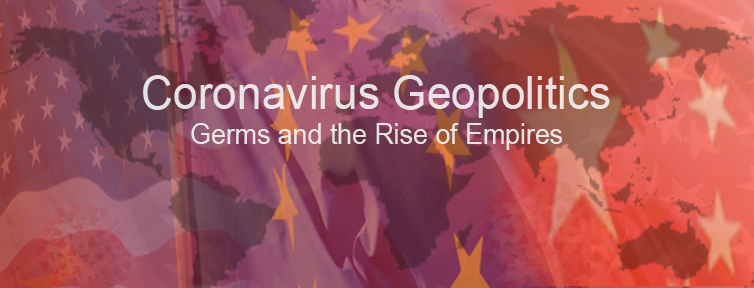Many centuries ago, the Plagues of Cyprian (250-266) and
Justinian (541-542)
killed a substantial fraction of the world's population. This
contributed to the decline of the Roman Empire
and the rise of other powers [1].
Five centuries ago, Europeans invaded the Americas. Their
germs and viruses killed most of the
natives. By recent estimates, 56 million of them died [2] [3] -
more than 10% of the world's population.
Without this "accidental genocide" through unconscious biological warfare,
the subsequent rise of European colonial powers might have been impossible.
One century ago, the "Spanish flu" emerged, apparently from Kansas [4]
or another source in
North America [4a].
(Don't expect US President Trump to call it the "American flu" though.)
In the wake of World War I,
the disease spread across the globe, killing several percent
of the world's population [5]
(the battles of WWI killed fewer than 0.5%).
The flu mortality rate of the US (0.5%) [6] was lower than
the one of its WWI adversaries; this may have helped the Allied forces [7].
Europe
was still the continent with
the biggest economy, but
in subsequent decades, its dominance waned,
while the US became a superpower.
In 2019, the coronavirus Covid-19 emerged, apparently from Wuhan.
By March 2020, China had stopped its spread,
according to the government.
Much of the rest of the world, however, was struggling.
Is this yet another herald of
China's rise
[10],
comparable to earlier ascents of powers facilitated
by germs and viruses?
Note that China, Singapore, Taiwan, Israel and other nations
that
meticulously track their inhabitants
through
modern surveillance
devices such as smartphones
[11] [12]
seem better prepared to deal with pandemics than privacy-protecting nations -
compare
Sec. 6 of [DEC].
What will be next in Coronavirus Geopolitics?
Polarization and rivalling spheres of influence
[13] [14] [15] [16]?
Or world-wide cooperation?
The planet's medical supply chains depend on China, which is
ramping up production and
offering help to EU countries, the US, and other nations
which are lacking equipment.
Will this expand into some sort of
Chinese Marshall Plan for the rest of the world?
The value of the original US Marshall Plan for
post-WWII Europe was about
$130 billion (in today's dollars), not more than
what a very rich individual owns.
By some estimates,
it triggered up to 0.35% of additional GDP growth [8].
More importantly, however,
the grateful recipients
responded with sympathy for the donor,
whose soft power grew.
A medical Marshall Plan of similar size would cost
just a small fraction of the ongoing Belt and Road initiative [9].
President Xi Jinping might consider this a great investment.
How will the world react?
 This work is licensed under a Creative Commons Attribution-NonCommercial-ShareAlike 4.0 International License.
This work is licensed under a Creative Commons Attribution-NonCommercial-ShareAlike 4.0 International License.
References
[1]
D. C. Stathakopoulos (2007). Famine and Pestilence in the late Roman and early Byzantine Empire.
[2]
A. Koch, C. Brierley, M. M. Maslin, S. L. Lewis (2019). Earth system impacts of the European arrival and Great Dying in the Americas after 1492. Quaternary Science Reviews. 207: 13-36.
[3]
O. Milman (2019).
European colonization of Americas killed so many it cooled Earth's climate.
The Guardian, 31 Jan 2019.
[4]
A. W. Crosby (2003). America's Forgotten Pandemic: The Influenza of 1918 (2nd ed.).
Cambridge University Press.
[4a]
M. Worobey, J. Cox, D. Gill (2019).
The origins of the great pandemic.
Evolution, Medicine, and Public Health, Vol. 2019, Issue 1, p 18-25, 2019.
[5]
T. N. Jilani, R. T. Jamil; A. H. Siddiqui (Dec 2019). H1N1 Influenza (Swine Flu).
[6]
U.S. Department of Health & Human Services (2012). The Great Pandemic: The United States in 1918-1919.
[7]
A. T. Price-Smith (2008). Contagion and Chaos. Cambridge, MA: MIT Press.
[8]
N. Crafts (2011). The Marshall Plan: A Reality Check.
CAGE Online Working Paper Series 49, 2011.
[9]
NY Times (13 May 2017).
Behind China's $1 Trillion Plan to Shake Up the Economic Order.
[10]
J. Schmidhuber (2005).
China's rise & former empires.
Letter to
Newsweek (July 4, 2005) in response to F. Zakaria's commentary (May 9, 2005).
[11]
A. Kharpal (CNBC, 2020).
Use of surveillance to fight coronavirus raises concerns about government power after pandemic ends. 30 Mar 2020.
[12]
C. J. Wang, C. Y. Ng, R. H. Brook (2020).
Response to COVID-19 in Taiwan - Big Data Analytics, New Technology, and Proactive Testing.
JAMA, 3 Mar 2020.
[13]
M. S. Larsen, R. Gramer (2020).
China Casts Itself as Global Savior While U.S. and EU Focus on Virus at Home. Foreign Policy, 19 Mar 2020.
[14]
W. Knight.
China Flexes Its Soft Power With 'Covid Diplomacy'. Initially criticized for covering up and failing to control the virus, China is rebranding its response as a symbol of leadership and strength. WIRED, 2 Apr 2020.
[15]
D. Wu (2020).
Not Made in China Is Global Tech's Next Big Trend. Bloomberg, 31 Mar 2020.
[16]
M. Karnitschnig (2020).
China is winning the coronavirus propaganda war.
Beijing deploys soft power as Europe and US fall short on solidarity.
Politico, 18 Mar 2020.
[DEC] J. Schmidhuber (02/20/2020). The 2010s: Our Decade of Deep Learning / Outlook on the 2020s. The relevant Sec. 6
compares
super-organisms such as cities & states & companies to biological
multicellular organisms whose individual
cells enjoy little privacy. It asks:
Are surveillance and loss of privacy inevitable consequences of increasingly complex societies?
Some nations may find it easier than others to become more complex kinds of
super-organisms at the expense of the privacy rights of their constituents.
.


